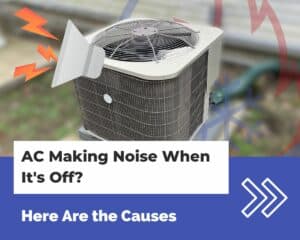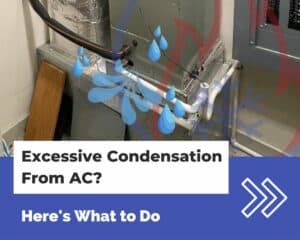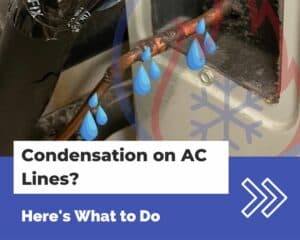Did your AC suddenly turn off?
Nothing is more frustrating that an AC that shuts down out of nowhere— all while your home stays hot.
There are many things that cause an AC to keep turning off—some are simple, while others are more involved.
In this article, I’ll go over all of the causes of an AC that keeps turning off. I’ll also go over what you should do if your AC keeps short cycling.
AC shuts off before reaching temperature
If your AC shuts off before reaching temperature, the first thing you should check is the setpoint offset on your thermostat.
The setpoint offset is the number of degrees from the setpoint that your thermostat will reach before turning off your AC.
For example, if your thermostat’s setpoint is 75°F and it has an offset of 2°F, then your AC will shut off when the temperature inside your home reaches 77°F.
The setpoint offset can be changed in the settings of your thermostat.
If your thermostat doesn’t have a setpoint offset, or if it’s not causing your AC to keep turning off, then read further.
Why your AC keeps turning off
An AC that keeps turning off is usually due to a dirty air filter, dirty condenser coil, or bad thermostat location. An AC that’s oversized will also keep turning off since it overcools your home.
Short cycling is the term used when an AC keeps turning off.
A short cycling AC is not good because it can cause damage to your AC’s compressor.
A short cycling AC will also use more energy to cool your home and give you higher utility bills.
An AC that short cycles may also cause high humidity in your home since the AC doesn’t run long enough to dehumidify your home.
Here are the top causes of an AC that keeps turning off:
- Dirty condenser coil
- Dirty air filter
- Thermostat is in a bad location
- Refrigerant leak
- Restriction in refrigerant flow
- AC capacitor is bad
- Bad contactor
- Wiring or electrical issues
I’ll go over them below.
Dirty condenser coil
A dirty condenser coil will cause your AC to keep turning off because of high head pressure.
High head pressure can damage an AC compressor if left unchecked. That’s why your AC condensing unit has a high pressure switch inside of it.
The purpose of the high pressure switch is to prevent high refrigerant pressure from damaging your compressor.
When the refrigerant pressure in your AC unit gets too high, the high pressure switch cuts off power from your compressor. This causes your AC to turn off until refrigerant pressures return to normal levels.
Your AC unit constantly turns off and then back on when the high pressure switch trips and then resets when the refrigerant pressures go back to normal.
If your AC condenser coil is dirty, you’ll need to clean it to prevent high head pressure in your AC system.
Having a clean AC condenser coil will help keep your AC running smoothly and prevent it from short cycling.
Dirty air filter
A dirty air filter will cause your AC to keep turning off due to low airflow.
Low airflow will cause low refrigerant pressures in your AC system. The low refrigerant pressures will eventually cause your AC unit’s low pressure switch to trip.
The low pressure switch is a device that exists to prevent damage to the AC compressor.
When the refrigerant pressures in your AC system get too low, the low pressure switch cuts off power from the compressor. Your AC unit will remain off until refrigerant pressures return to normal levels.
The constant on-off-on-off behavior is caused by the low pressure switch tripping and then resetting over and over again.
If your AC’s air filter is dirty, you need to swap it out with a new filter.
Changing your air filter will help prevent your AC from turning off randomly.
Thermostat is in a bad location
If your AC’s thermostat is located in the direct path of an air vent it will read an incorrect temperature and keep turning off your AC.
If your thermostat is located in a cool area, then your thermostat will keep turning off your AC even when it is warm in the rest of your home.
Your thermostat can also sometimes receive cool drafts of air through the walls in your home that mess up its temperature reading and cause your AC to short cycle.
Another bad location for an AC thermostat is in an isolated area of your home that gets cooler than other areas, such as a small bedroom.
The best location for your thermostat is in a central location of your home, away from windows and air vents—such as a hallway.
Refrigerant leak
A refrigerant leak will cause your AC to keep turning off due to the low pressure switch tripping.
When your AC runs with a refrigerant leak, it might keep turning off due to low refrigerant pressure. The low pressure switch will keep tripping and cutting off power to the compressor.
If your AC has a refrigerant leak, it usually only exhibits on-off-on-off behavior for a little while. Eventually, the AC will turn off and not turn back on again.
When a substantial amount of refrigerant has leaked out of your AC, it won’t turn on again.
If your AC has a refrigerant leak, you need to get an HVAC technician to repair the leak and recommission the system.
Unfortunately, repairing a refrigerant leak isn’t something that you can do on your own.
Restriction in refrigerant flow
A refrigerant restriction will cause your AC to keep turning off due to low refrigerant pressure in the unit.
If your AC unit has a refrigerant restriction, its low pressure switch will trip whenever the unit runs.
Refrigerant restrictions are quite hard to pinpoint.
One sign that your AC system has a refrigerant restriction is if one of its components starts freezing up. For example, if you see your AC line start freezing up, there’s a chance that you have a refrigerant restriction.
If your AC has a restriction in refrigerant flow, you need an HVAC technician to repair the restriction.
The technician will need to replace the clogged part and recharge your AC system.
AC capacitor is bad
A bad capacitor will cause your AC to keep turning off since it does not have enough capacitance to keep your AC unit running.
If your AC capacitor is bad, it usually won’t start at all.
However, an AC with a bad capacitor will sometimes startup—only to shut off suddenly after running for a short time.
You can test your AC capacitor with a multimeter if you suspect that your AC’s capacitor is bad.
Check out my article below for a guide on how to test your AC’s capacitor:
Bad contactor
A bad contactor will cause your AC to turn off when it’s not supposed to.
The contactor is the “switch” that turns on your AC unit outside.
If the electromagnet inside the contactor is not working, then the contactor won’t turn on your AC unit.
The contactor’s electromagnet can sometimes get worn out, and only intermittently pull the contactor in and turn on your AC unit.
Another issue with contactors is their contacts can get dirty and pitted.
If the contactor’s contacts are dirty, then it will only make an intermittent connection and cause your AC to turn on and off randomly.
Another thing that will cause your AC to keep turning off is if the low voltage wiring connected to the contactor coil gets loose. This causes the contactor to “chatter” as it rapidly engages and disengages because of loose wiring.
If you suspect that your AC’s contactor is bad, then you’ll need to swap it out for a new one.
However, AC contactors rarely go bad—if your AC unit keeps turning off it’s usually something else that’s causing the issue. But I thought that I’d mention the contactor here since they do cause issues from time to time.
Wiring or electrical issues
Loose, corroded, or bad wiring can cause your AC to keep turning off.
The wiring inside your AC unit can loosen up over time from the vibrations of the fan and compressor.
The wiring in your AC may also corrode if moisture or rain gets inside your AC unit or disconnect.
Loose or corroded wiring is an uncommon situation, but it does happen from time to time.
If you’ve checked everything else and suspect that your wiring is bad, then I recommend calling in an HVAC professional to check the wiring in your AC unit.



